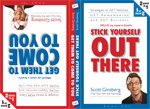
 You’ve chosen an uncertain path.
You’ve chosen an uncertain path.
You’ve adopted an inconvenient lifestyle.
You’ve embarked upon an unconventional journey.
You’ve felt the voice inside you growing more urgent.
You’ve committed yourself enough so you can’t turn back.
IN SHORT: You’ve decided to play for keeps.
This is the critical crossroads – the emotional turning point – in the life of every young artist.
I’ve been there myself, and here’s a list of suggestions to help you along the way:1. Carry your own standards for judging your artistic talents. Never let the validity of your talent hang in the balance of some critic’s opinion. Employ only the approval of your heart.
Create out of pleasure, not under constraint. Otherwise your art suffers the consequences of external expectation. And before you know it, people who don’t matter pilfer your life without you even knowing it.
The key decision point is figuring out whom to ignore. Because whether or not you want to admit it: Not everybody wants you to become successful. And not everybody will be happy for your success. In fact, outside of those who really, really love you – your success will piss most people off. And it will drum up significant resentment, even if it’s never vocalized.
My suggestion: Stay undeterred when people attack you for exercising your ability. Proactively pursue your own path despite lack of popular appreciation and understanding. Even when people try to push boulders into your path. Why are you still listening to those trying to talk your dreams down?
2. End the self-editing. As a writer and publisher, I have a personal policy: I don’t edit. I don’t rewrite. I don’t do drafts. I don’t go back and revisit old work. I write things once, I write them in blood, and I publish them to the world with zero regret and infinite confidence.
It’s not perfect. And sure, I might change a few words here and there. Or modify my position on an issue as I evolve. And of course, always make grammatical improvements at the request of my editor.
But that’s proofreading. Editing means correcting the core of something. And the moment you allow that to happen – to the work or to the person who authors it – is the moment you betray yourself.
That’s the problem with self-editing: It renders your creativity timid and impotent. And it’s not fair to your core to let that happen. That’s what I learned on day one of starting my career right out of college: Living a life without editing yourself isn’t just about writing. It’s about walking your truth. It’s about breathing your brand. It’s about staying loyal to yourself. What self-imposed boulder is in the way of giving your river a voice and letting it flow?
3. Engage the muscle of yes. In a recent interview on Fresh Air, The Black Keys explained how their success as a band was largely a function of companies using their music in commercials.
“Radio stations weren’t spinning our records, and that’s why saying yes to the advertising opportunity was bigger than anything we’d ever done,” said drummer Patrick Kearney. “But, we never feel that we were selling out. Just saying yes an opportunity to reach a wider audience.”
Lesson learned: Artistic abundance is a function of receptivity. And it hinges on your willingness to engage the muscle of yes. That’s the distinction: Amateurs get locked into limited concepts of who they are; but pros stay engaged with life’s possibilities.
That way, when a new artistic opportunity comes along, instead of shutting it down because it’s new, they think to themselves, “Oh boy! Another chance to do more of the things I love!” and then aggressively bite into it. Even if it’s not perfect the first few times around.
Because the reality is: Not everything you make will feel like a masterpiece. And it doesn’t have to be. Artists who make history forget about getting things right and focus on getting things moving in the right direction. They know that what matters is not the piece itself – but its contribution to their larger body of work. What do you need to start saying yes to?
4. Screw the masses. You can certainly buy tickets for the starving artist lottery, but it might be smarter – and cheaper – to go out and find the market for what you love. Or better yet, create it yourself. Even if it’s a small one. Cartoonist and writer Hugh McLeod calls this your micro-audience. This is the tiny handful of people who are likely to buy your high-end product.
“In the old, pre-internet days, if you were a cartoonist like me and wanted to be successful, you pretty much had to be famous. And those gigs were hard to come by. You needed a big time publication syndicate or media company to back you. And of course, all this required a very large audience. Thank God the Internet came along and changed everything.”
The hard part is divorcing your ego from the illusion that market size matters – because it doesn’t.
I know a guy who once wrote a book for five people. Five people. Naturally, those five people were big executives at big companies who later retained his consulting services for big money. Sounds like size didn’t matter after all.
The question is: Are you willing to change the game, change the rules, or create your own game where there are no rules? I hope so. Because waiting around for an audience is surefire path to artistic failure. Figure out which of the mainstream hoops are not worth jumping through, and then forge ahead without stopping. Why be a needle in a stack of needles when you could be the only needle in box?
5. Remove the threat of rejection. Writers love to pontificate about how many editors, publishers and agents rejected them before they made it big. Personally, I never chose to participate in that literary pissing contest. I’ve always practiced Miyagi’s Law, which states that the best way to block a punch is to not be there. For example:
Want to know how many publishers rejected my books?
None. Because I did them myself. Including the recent numero twelve.
Want to know how many agents turned my proposals down?
None. Because I never submitted any.
Want to know how many editors told me my work wasn’t good enough?
None. Because, as you already learned, I don’t edit myself – not on the page or in person.
It’s not about being afraid of rejection – it’s about putting yourself in a position where rejection can’t even find you. Why torture yourself listening to voices that don’t matter when you could be executing work that does?
Seems to me, the best way to bring home the bacon is to raise your own pigs. That way, when you’re hungry, all you have to do is grab a knife and walk outside. Sure beats waiting in vain only to be rejected by someone who doesn’t matter. What would it take for you to position yourself as the sole shot caller of your work?
REMEMBER: When you’re ready to play for keeps, your work will never be the same.
Make the decision today.
Show the world that your art isn’t just another expensive hobby.
LET ME ASK YA THIS…
Have you committed with both feet yet?
LET ME SUGGEST THIS…
For the list called, “49 Ways to become an Idea Powerhouse,” send an email to me, and you win the list for free!
* * * *
Scott Ginsberg
That Guy with the Nametag
Author, Speaker, Entrepreneur, Mentor
[email protected]
 The world’s FIRST two-in-one, flip-flop book!
The world’s FIRST two-in-one, flip-flop book!
Buy Scott’s comprehensive marketing guidebook on Amazon.com and learn how to GET noticed, GET remembered and GET business!
